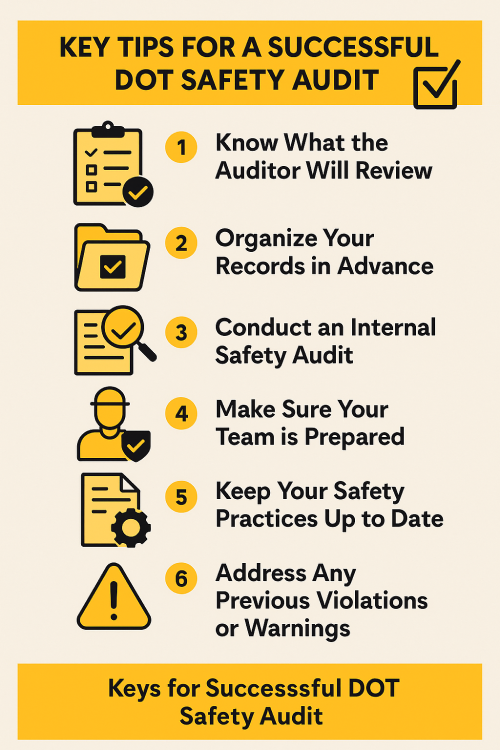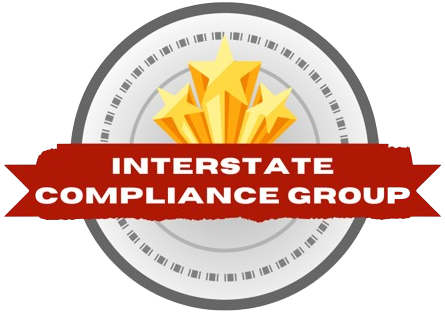Receiving notice of a DOT safety audit can feel intimidating—especially for new carriers. But with proper preparation, it doesn’t have to be. The Federal Motor Carrier Safety Administration (FMCSA) conducts these audits to ensure carriers are following federal safety regulations. Failing one can mean serious consequences, including fines, delays, or even suspension of your operating authority.
The good news? If you know what to expect and how to get ready, you can pass with confidence.
In this guide, we’ll break down key tips for preparing for a DOT safety audit, from recordkeeping to safety practices. And if you want expert guidance, MyICGroup’s Safety Audit service is here to help.
1. Know What the Auditor Will Review
Understanding what the audit covers is the first step to passing it. A DOT safety audit typically examines:
- Driver Qualification (DQ) files
- Hours of Service (HOS) logs
- Vehicle maintenance records
- Drug and alcohol testing program
- Accident register and incident history
Knowing the scope allows you to focus on the most important documents and procedures.
2. Organize Your Records in Advance
The majority of audit failures result from incomplete or disorganized records. Make sure your files are neat, accessible, and up to date.
Must-Have Records Include:
- Complete DQ files for every driver
- HOS logs with no violations and proper ELD usage
- Maintenance logs for each vehicle, including inspection and repair history
- Documentation of drug/alcohol test results and consortium participation
- Proof of insurance, registration, and IFTA/IRP compliance
Keep digital and physical backups in case of technical issues.
3. Conduct an Internal Safety Audit
Before the DOT arrives, run your own internal audit. This helps uncover any gaps or issues you can fix ahead of time.
Tips for Self-Auditing:
- Review a random sample of DQ files for completeness
- Check logbooks for accuracy and ensure no HOS violations
- Ensure drug testing records are up to date and filed correctly
- Validate that vehicle maintenance logs are current and complete
An internal review is your best chance to clean up issues before an official audit finds them.
4. Make Sure Your Team is Prepared
A successful audit isn’t just about paperwork—it’s also about how your team presents itself.
Team Prep Checklist:
- Make sure drivers and managers know what the audit is and why it matters
- Review how to communicate respectfully and clearly with auditors
- Train staff to locate and explain any document the auditor requests
When everyone is on the same page, audits go much more smoothly.
5. Keep Your Safety Practices Up to Date
DOT auditors also want to see that your company has active safety procedures, not just records on paper.
Key Practices to Review:
- Regular driver safety training and meetings
- Written safety policies and manuals
- Incident reporting and accident investigation protocols
- Preventive maintenance and inspection routines
These actions show your commitment to safety beyond the paperwork.
6. Address Any Previous Violations or Warnings
If you’ve had previous inspections, make sure any violations have been addressed and corrected.
What to Do:
- Keep records of corrective actions taken
- Provide documentation showing compliance improvements
- Monitor your CSA score to identify risk areas
Demonstrating a proactive approach can improve your audit outcome.

Final Thoughts
Preparing for a DOT safety audit doesn’t have to be overwhelming. With good recordkeeping, internal reviews, staff training, and a strong safety culture, you can walk into the audit feeling ready.
And if you’d like help organizing your documentation and ensuring your program is fully compliant, MyICGroup’s Safety Audit service is ready to support you every step of the way. Pass your audit, protect your authority, and keep your fleet running strong.





